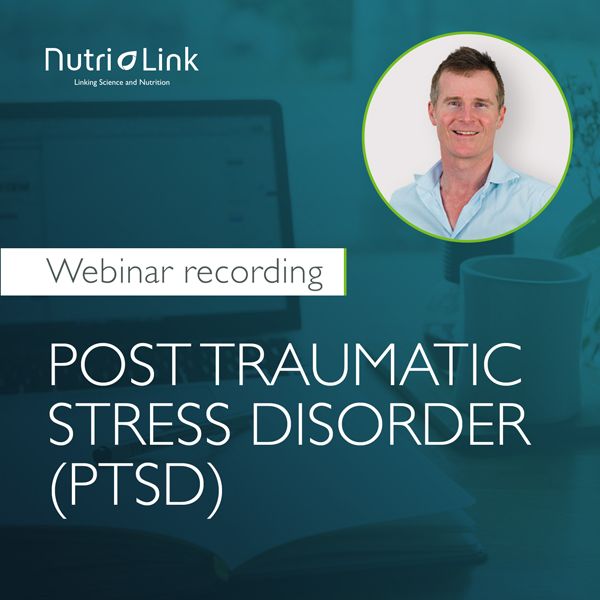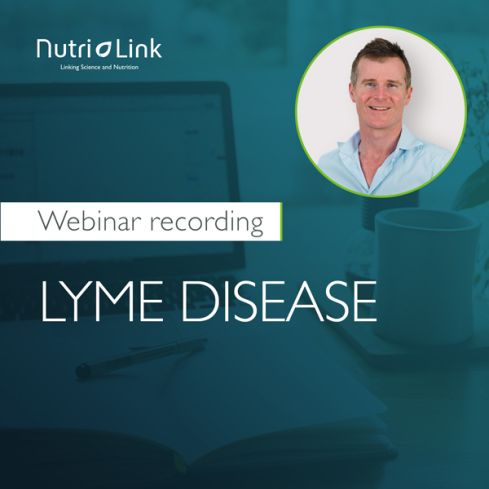WEBINAR: Post Traumatic Stress Disorder (PTSD) - Recorded
Title: Post Traumatic Stress Disorder (PTSD) Webinar
Presenter: Antony Haynes BA (Hons) RNT mBANT
Date: Wednesday 19th October 2022
Time: 12pm – 1:30pm BST (1 hour presentation plus 30 minute live Q&A at the end)
Price: £20 + VAT (50% credited back after live attendance)
WEBINAR ORDERING – please make sure you are logged into your account before attempting to purchase this webinar. Once logged in, you will be able to add this product to your basket and check out online.

order before 2pm for next working day delivery (UK Only)
Food supplements should not be used as a substitute for a balanced and varied diet.
Post Traumatic Stress Disorder (PTSD) Webinar
PTSD is a syndrome of distress that develops after exposure to traumatic life experiences. Traumatic stress experiences in early life are strong predisposing factors for later PTSD development.
Symptoms may include disturbing thoughts, feelings, or dreams related to the events, mental or physical distress to trauma-related cues, attempts to avoid trauma-related cues, alterations in the way a person thinks and feels, and an increase in the fight-or-flight response. These symptoms last for more than a month and sometimes many years after the event.
Research shows that approximately 10% of those exposed to trauma go on to develop PTSD. In the UK in 2014, 3.7% of men and 5.1% of women screened positive for PTSD.
Dysregulation of both the hypothalamic-pituitary-adrenal (HPA) axis and the norepinephrine–sympathetic nervous system (NE-SNS) is associated with the pathophysiology of PTSD. Studies have demonstrated a neuroendocrine profile unique to adults with PTSD, with centrally elevated corticotropin-releasing hormone (CRH), low cortisol in the periphery, and elevated catecholamines. People experiencing PTSD are candidates for potential benefit from Nutritional Therapy because this discipline is one that can profoundly positively influence their cortisol levels and rhythms and thereby help to restore neuro-endocrine balance.
- Learn about the definition of and signs and symptoms of PTSD.
- Learn about the factors that lead to PTSD.
- Learn about the estimated prevalence of PTSD.
- Learn about conventional treatment of PTSD such as psychotherapies such has EMDR and CBT.
- Learn how PTSD causes chronic dysregulation of the stress system and how this leads to diminished health and increased morbidity.
- Learn about the pattern of daily salivary cortisol associated with PTSD and how to positively influence these levels to bring about overall health improvements.
- Learn why evaluation and treatment of sleep and circadian disruption are considered the first steps in PTSD management.
- Learn about key nutritional supplements to restore a healthy circadian rhythm of the HPA and support an individual with PTSD.
How do I register for a webinar?
Our free webinars are available to Practitioners and Students registered with Nutri-Link. You can create your free account here - Registration | Nutri-Link UK
Is there a cost to attend the webinars?
No, there is no cost for our upcoming webinars Practitioners and Students registered with Nutri-Link.
Can I book multiple webinars at once?
Yes, you can book multiple webinars at once. You will receive a reminder ahead of the webinars.
What happens after I complete my booking?
You will receive a confirmation booking & the booked webinar will appear on your Nutri-Link account.
How do I join the webinar on the day?
When you register you will receive a confirmation email (usually titled "You're registered for [Webinar Name]"), this is via email, the registration link can also be found on your Nutri-Link downloads.
To join a Microsoft Teams webinar after registering, click the "Click here to join the meeting" link in your confirmation email, or use the calendar event sent to your email.
Alternatively visit ‘My Account’ and ‘My Downloadable Products’ where you will also find the link to ‘Register Online’. Once registered by either method Teams will email you your link to join the live webinar.
What if I can’t attend after booking?
Not a problem, all webinars are recorded & the link is sent via email so you can watch at a time that is suitable for you.
Do they carry CPD hours?
Not live, however, you can submit the hour as self-directed learning.
Will I get a certificate of attendance?
Yes, you will receive a certificate of attendance which can be downloaded from your online account.
Will I receive the slides for the webinar?
Yes, they are uploaded to your online account post-webinar along with any other supporting materials.
Who can I contact if I have technical issues or questions?
You can either telephone: 0333 577 0404 or email [email protected]. Our offices are open 9:00 am to 5:00 pm, Monday to Friday.



